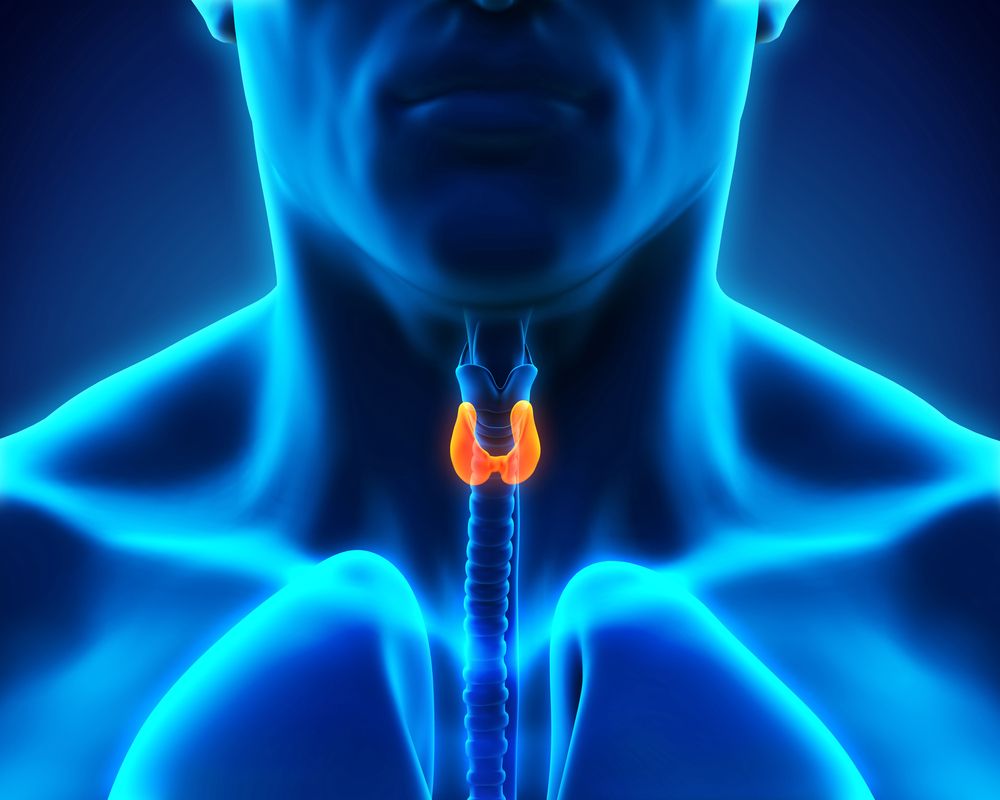Thyroid Cancer: Symptoms, Diagnosis & Treatment

The thyroid is a butterfly-shaped gland that wraps around the throat and is part of the body's endocrine system. Between 1975 and 2013, the cases of thyroid cancer diagnosed yearly have more than tripled, according to a 2017 study published in the Journal of the American Medical Association (JAMA).
"While overdiagnosis may be an important component to this observed epidemic, it clearly does not explain the whole story," said Dr. Julie Sosa, one of the authors of the new study and the chief of endocrine surgery at Duke University in North Carolina.
The American Cancer Society estimates there will be 56,870 new cases of thyroid cancer (42,470 in women and 14,400 in men) in the United States in 2017, and around 2,010 deaths. Up to 60 percent of people with a thyroid disease don't realize there is problem, though, according to the American Thyroid Association.
Types
According to the National Cancer Institute, there are four types of thyroid cancer: papillary, follicular, medullary and anaplastic.
Papillary cancer is the most common form of thyroid cancer, followed by follicular cancer. However, follicular cancer is considered more malignant, or aggressive, than papillary, according to EndocrineWeb. Both types form in the follicular cells of the thyroid. Most of the thyroid tissue consists of follicular cells, which secrete the iodine-containing thyroid hormones thyroxine (T4) and triiodothyronine (T3), according to Johns Hopkins Medicine.
Medullary cancer forms in the C cells of the thyroid, which make the hormone calcitonin. While the other types of thyroid cancer tend to be slow-forming, anaplastic is a rare form of aggressive cancer in the thyroid.
Causes & symptoms
The causes of thyroid cancer vary. It can be passed on genetically, or it can be caused by radiation to the head or throat as a child, according to the National Cancer Institute.
"Women are particularly at risk for a thyroid issue," said Dr. Jerome M. Hershman, a professor of medicine at the David Geffen School of Medicine at UCLA and author of the thyroid sections of the Merck Manual. "One in eight women will develop a thyroid disorder during the course of their lives — that's five to eight times the rate in men."
A malfunction in the thyroid, such as tumors from cancer, can cause a wide range of problems in the human body.
"Thyroid hormones impact a host of vital body functions, including heart rate, skin maintenance, growth, temperature regulation, fertility and digestion," Hershman said.
Some symptoms that can be caused by thyroid cancer are neck pain, a hoarse voice and enlarged lymph nodes. Swelling in the area or lumps is not necessarily a sign of cancer, though.
"Up to 70 percent of middle-age females and 40 to 50 percent of middle-age males have thyroid nodules, said Dr. Melanie Goldfarb, an endocrine surgeon and director of the Endocrine Tumor Program at Providence Saint John's Health Center in Santa Monica, California, and an assistant professor of surgery at the John Wayne Cancer Institute in Santa Monica. "You can also be born with an extra piece anywhere as high up as the base of your tongue."

Diagnosis
There are many ways a doctor may go about diagnosing thyroid cancer. Typically, a physical exam will be the first step. The medical professional will look for changes in the gland and ask about family history and exposure to radiation. Next, blood tests may be ordered to see if the thyroid is functioning properly. A biopsy, imaging tests and genetic disorder tests may be ordered to confirm a diagnosis, according to the Mayo Clinic.
Treatment
In many cases, treatment for thyroid cancer involves removing the entire gland surgically. Sometimes, medical professionals will opt to remove just a portion of the gland. The full or partial removal of the thyroid gland is called a thyroidectomy.
Lymph nodes may also be removed to check them for infection, according to the Mayo Clinic. Radioactive iodine, radiation therapy, injecting the cancer with alcohol, drug therapy or chemotherapy may also be ordered as treatment.
If the thyroid is removed, the patient will be given a prescription for a thyroid hormone medication called levothyroxine. This is usually a small pill that is taken daily for the rest of the person's life. Levothyroxine provides the hormones the thyroid would produce if it were still intact. It also suppresses the production of the thyroid-stimulating hormone (TSH) that comes from the pituitary gland. This is important because high TSH levels can stimulate remaining cancer cells to grow.
Additional resources
Sign up for the Live Science daily newsletter now
Get the world’s most fascinating discoveries delivered straight to your inbox.











